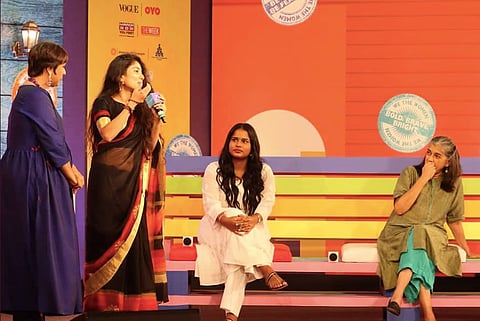

As the celluloid world still broadly prefers fair-skinned women to take up lead roles in movies and in ads, a few women are striving hard to break the stereotypes and put their foot down. In this process, they start a conversation about colourism — discriminating an individual based on his/her skin colour — which is deep-rooted in the film industry and, by extension, in society.
And so, it was no wonder that veteran actor Rathna Pathak-Shah, actor Sai Pallavi, models Varshita Thatavarthi and Seema Hari looked comfortable in their own skin when they were discussing, at length, colourism and racism (associated with skin colour) at the ‘We the Women’ in Bengaluru, which was organised by Facebook and UN Women, and curated by journalist Barkha Dutt.
Sai Pallavi’s categorical refusal to endorse a fairness product, which made people sit up and take note, became the starting point of the conversation. The women shared their thoughts on various aspects of how society still treats women differently based on their skin colour, forcing many to resort to extreme measures to ‘fit into’ the ‘ideal version’ of women.
A time before Rihanna or Beyonce
There were two reasons people in her native town mourned when a child was born, noted Rathna Pathak-Shah — one, if the child was a girl; and two, if the child was dark-complexioned.
“I was accepted since my skin tone was neither here (fair) nor there (dark). It, however, doesn’t mean I don't see what's happening around me,” she added.
Varshita Tharavarthi, who modelled for designer Sabyasachi Mukherjee, on the other hand, said that she was made to sit separately at her school in New Delhi. Dealing with that kind of discrimination was a traumatic experience, she recalled.
“Since it was a time when we did not have a Rihanna or a Beyonce to celebrate ourselves, it was tough,” she pointed out.
People’s acceptance changes things
For actor Sai Pallavi, insecurity was an inseparable part of her existence until she was chosen as ‘Malar miss’ in the Malayalam movie, Premam.
“I have been one of you,” she told the audience. “I have been insecure during a phase of my life. We grow up seeing perfect body shape and features on screen. I didn't know if I could accept myself like this. But then Alphonse (Puthren) picked me to act in Premam and I got to see the comments on Twitter after the movie. It was nice to see that people accepted me for who I am,” she explained.
Irrespective of the ‘industry definition of beauty’, Seema Hari, an engineer, model and an anti-colourism activist, proudly dons a tag which read ‘Kali’ on her pockets. Noting how the perception of skin colour varies with individuals, she said, “In California, I have seen people applying layers of sunscreen lotion and protecting their skin. But for me, I have an inherent advantage of being able to tolerate the heat; melanin is a blessing.”
Show real women on-screen
The standards for beauty seems to be dictated by those in the film and fashion industry, and that’s where the change must begin — the women on the panel unanimously noted.
“I want the fashion industry to show real women so that young girls get inspired to be themselves,” said Varshita. She recalled how she was once rejected from modelling for years due to her curvy figure and dark skin, until one day, she got her big break from Sabyasachi Mukherjee.
The perspectives of a story change noticeably depending on who is at the helm of the project. Acknowledging this, Rathna Pathak stated that the entry of more women in production will change things phenomenally. “If we make, write and tell our own stories, it will initiate change,” she said.
“We also need to communicate with young men about colourism and colour-based discrimination; we are so busy talking about this only to women,” she added.
Time to re-examine our culture
While advocacy and fighting against discrimination lay on one side, it is an undeniable fact that change, like charity, must begin from home.
“Until we address all the prejudice (we have) within, all this is going to be superficial,” said Rathna Pathak, adding that there is a pressing need to drive the message of diversity across the industries, more so because India is a hot-bed of diversity.
“We are in a place where diversity is a given. But what causes this (discrimination based on skin tone)? When we point at a child and comment on her/his colour, what kind of culture are we boasting about? It is about time we examine our ‘sanskriti’,” she said.
The world will continue to exploit our insecurities, and until that exists, the prejudice will never end, noted Sai Pallavi; and that’s why, she said, it is imperative one is confident in his/her own skin.
She was also presented with an award for walking the talk by being comfortable in her own skin and refusing to endorse a fairness product.